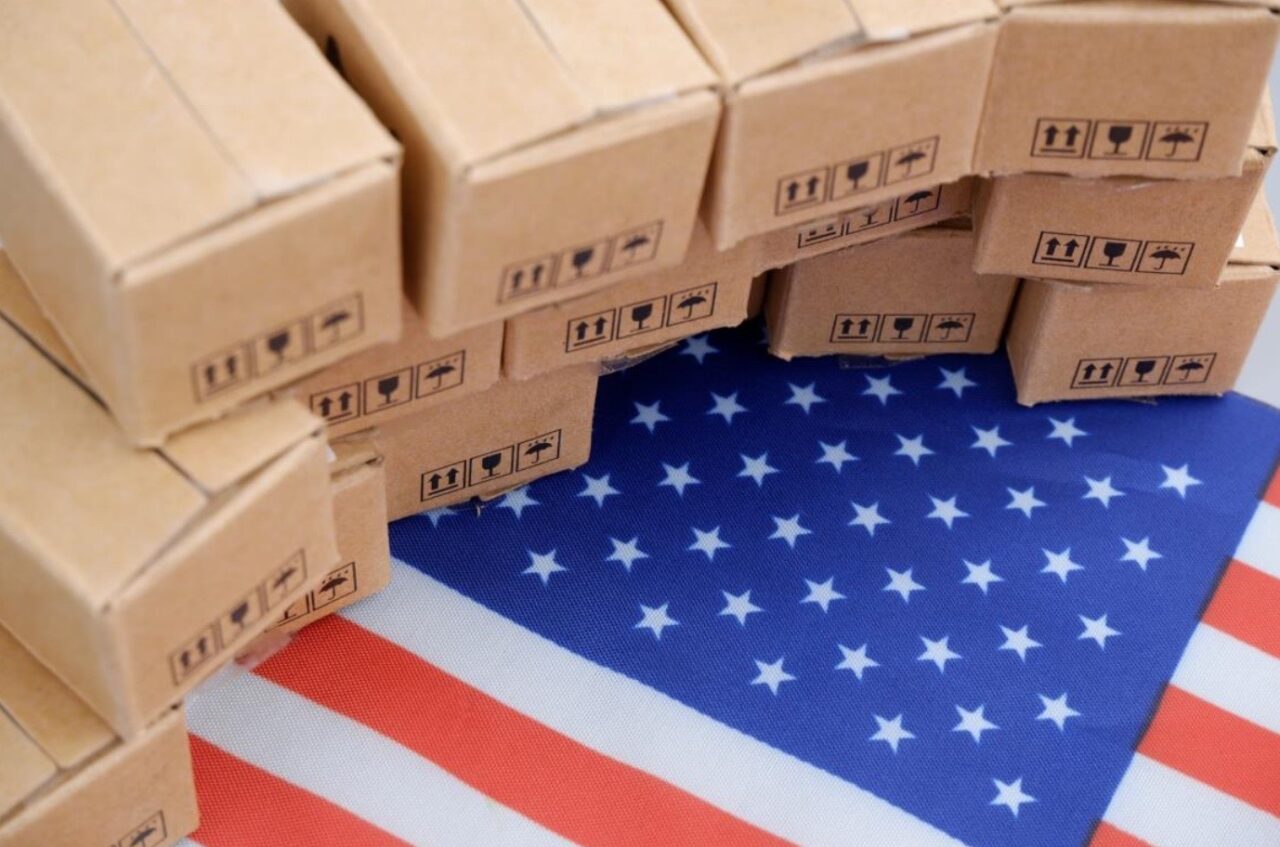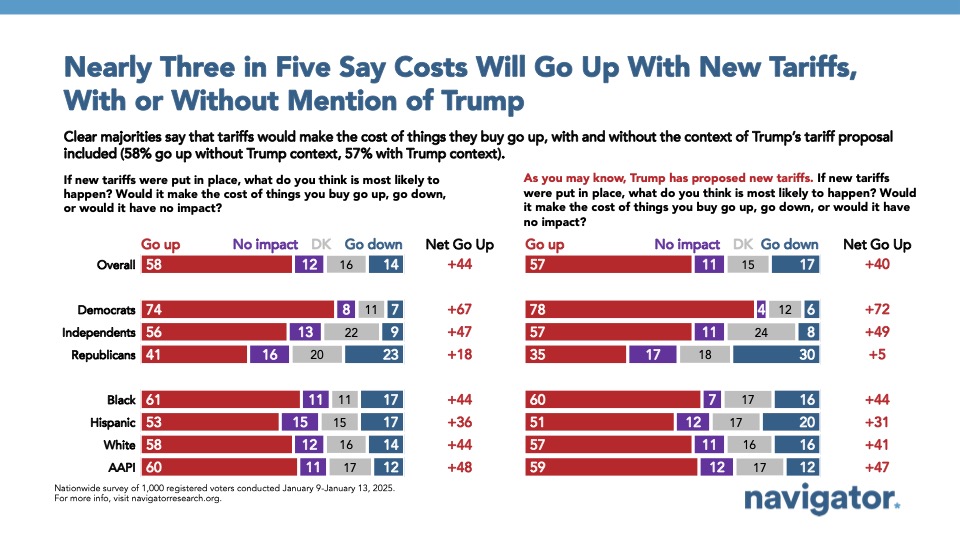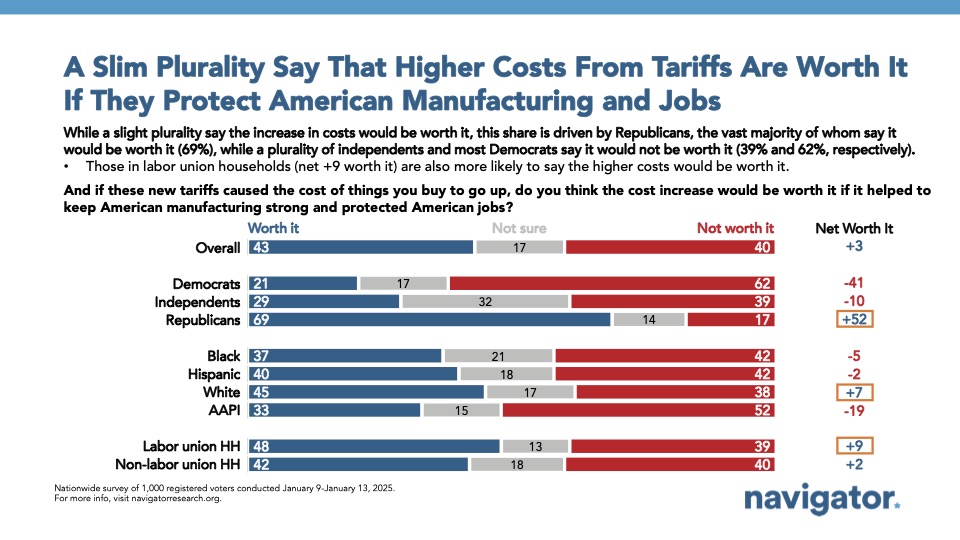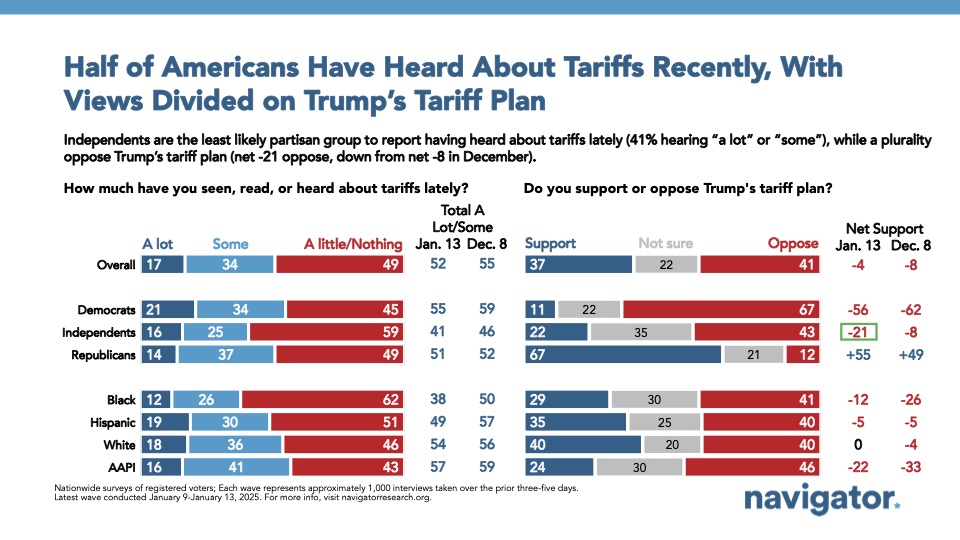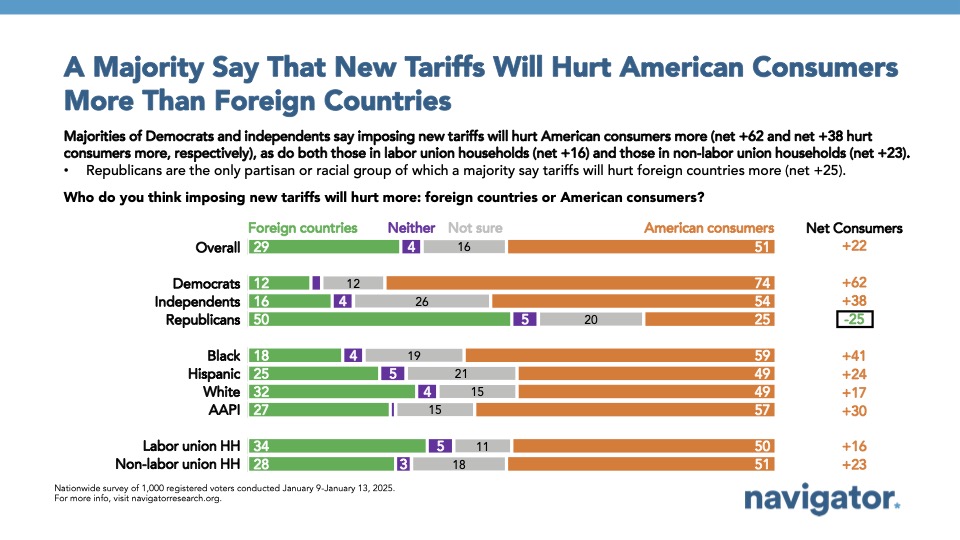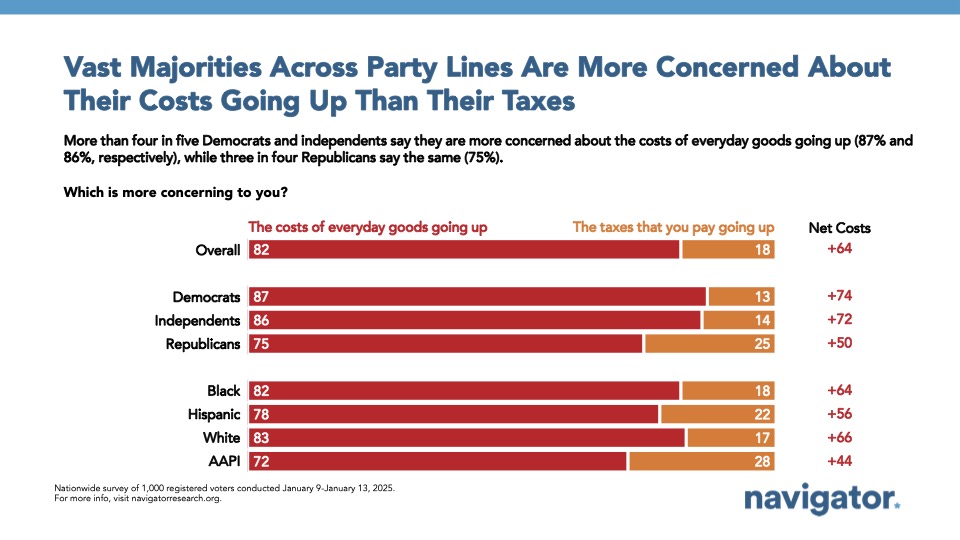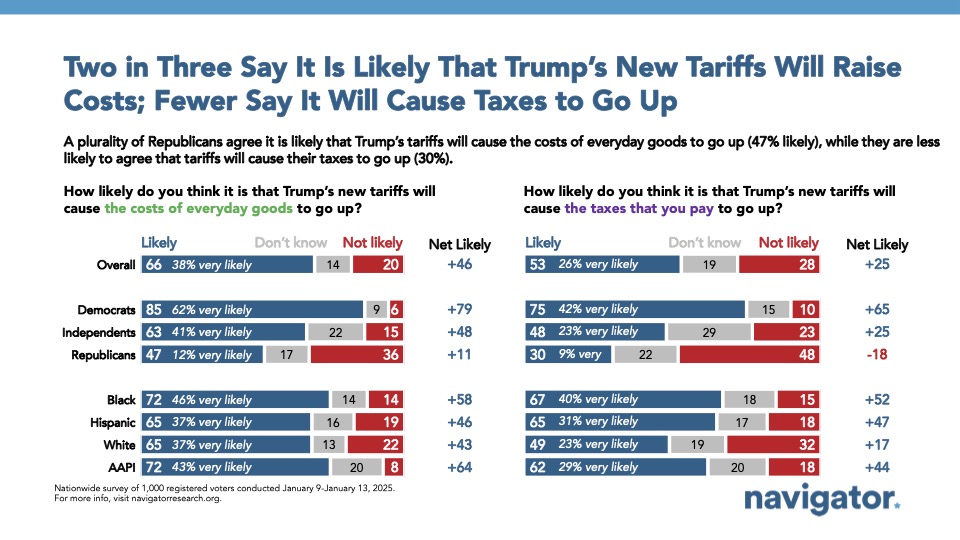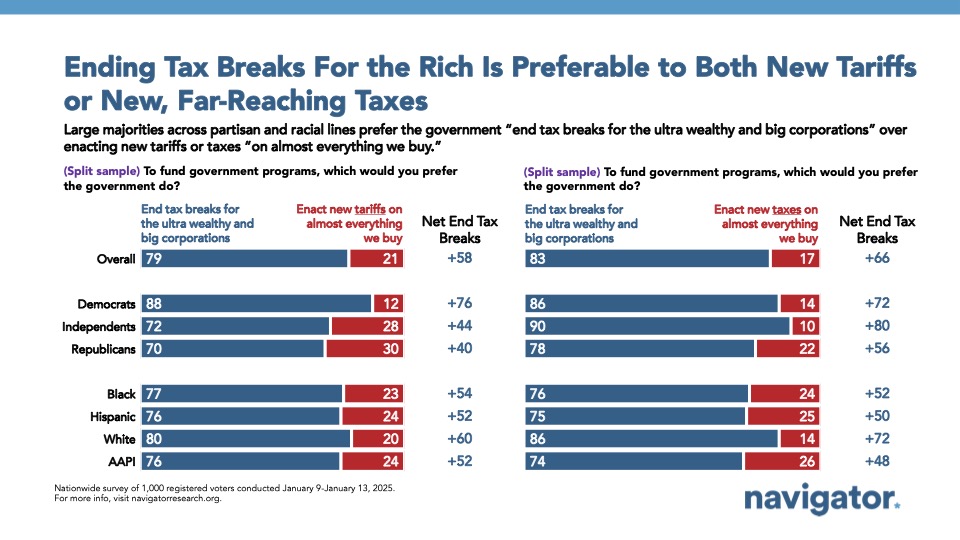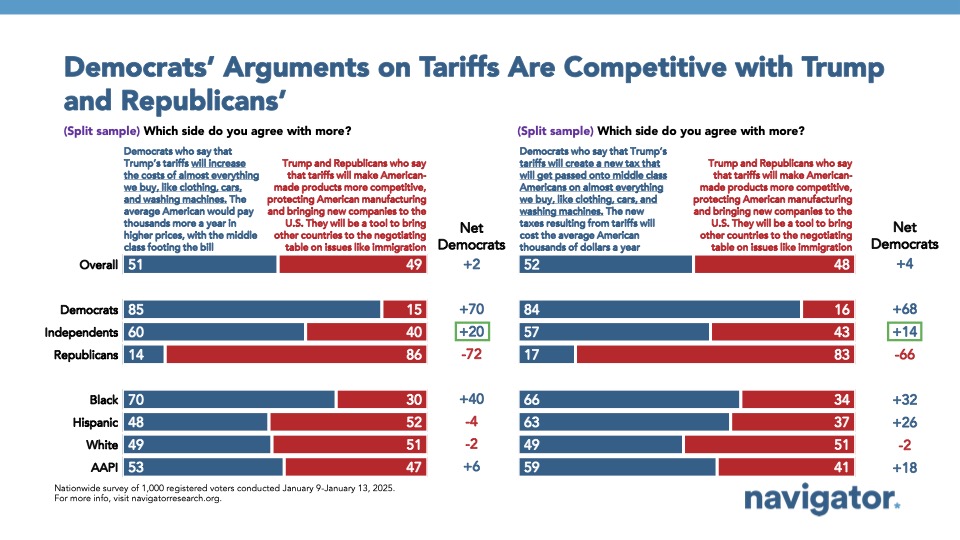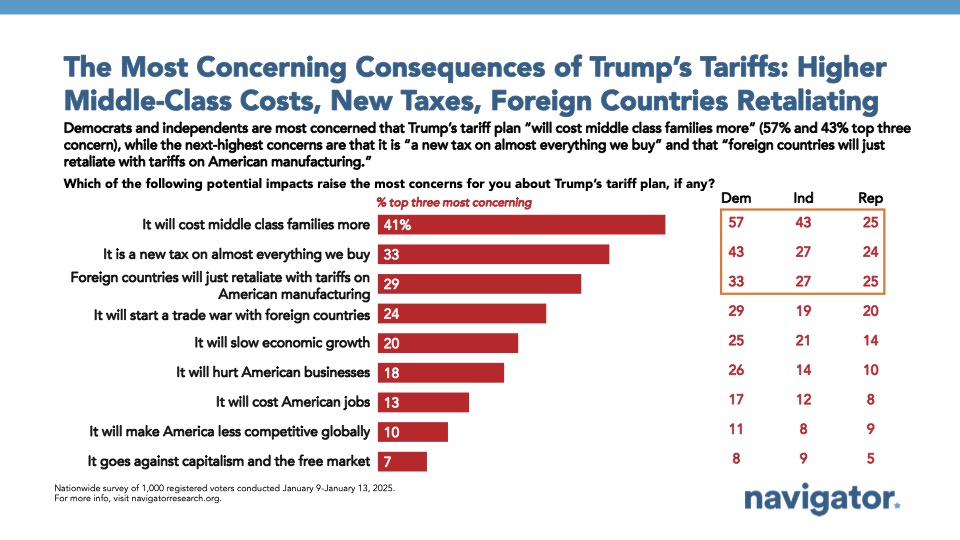Poll: Trump’s Tariffs Policy
This Navigator Research report contains polling data on the latest perceptions of Trump’s proposed tariff plan, including what Americans see as the most likely outcomes of new tariffs, who will be hurt by new tariffs, and whether a rise in costs from new tariffs would be worth it to protect American manufacturing.
Americans believe new tariffs would increase costs – but are divided on whether it would be worth it if they protect American manufacturing.
By a 40-point margin, Americans believe the new tariffs, proposed by President Trump, will cause costs to increase (57 percent costs go up – 17 percent costs go down). Perceptions of how new tariffs will affect costs are highly partisan, with 78 percent of Democrats, 57 percent of independents, and 35 percent of Republicans believing they will cause costs to increase. Americans are split on whether an increase in costs from new tariffs would be worth it if it led to strengthening American manufacturing (net +3; 43 percent worth increase in costs – 40 percent not worth increase in costs), with Democrats (net -41; 21 percent worth increase in costs – 62 percent not worth increase in costs) and independents (net -10; 29 percent worth increase in costs – 39 percent not worth increase in costs) being the least likely to believe an increase in costs would be worth it and Republicans being the most likely to believe an increase in costs would be worth it (net +52; 69 percent worth increase in costs – 17 percent not worth increase in costs).
- New tariffs are seen as more likely to hurt American consumers than foreign countries (51 percent American consumers – 29 percent foreign countries), including by 74 percent of Democrats and 54 percent of independents. Republicans are most likely to believe tariffs will hurt foreign countries (50 percent) more than American consumers (25 percent).
- Just over half of Americans say they have seen, read, or heard “some” or “a lot” about tariffs (52 percent), with fewer independents saying they have heard about it (41 percent). Support for Trump’s tariff plan is highly partisan (net -4; 37 percent support – 41 percent oppose), with two in three Republicans supporting the plan (net +55; 67 percent support – 12 percent oppose) and the inverse among Democrats (net -56; 67 percent support – 11 percent oppose). A plurality of independents oppose Trump’s tariff plan, though over a third are unsure (net -21; 22 percent support – 43 percent oppose – 35 percent unsure).
Americans are more concerned about an increase in costs than an increase in taxes and see new tariffs as a driver of both.
Four in five Americans say they are more concerned about the costs of everyday goods going up than the taxes they pay going up (82 percent costs of goods – 18 percent costs of taxes), including 87 percent of Democrats, 86 percent of independents, and 75 percent of Republicans. Majorities believe new tariffs would lead to an increase in both the costs of goods and taxes, Americans are more likely to believe the costs of everyday goods will go up as a result of new tariffs (net +13; 66 percent costs of everyday goods will go up – 53 taxes will go up), including a plurality of Republicans (net +11; 47 percent likely costs of everyday goods will go up – 36 percent not likely costs of everyday goods will go up).
- 79 percent of Americans would rather government programs be funded through ending tax breaks for the ultra wealthy and big corporations as opposed to enacting new tariffs (21 percent). When given the option between ending tax breaks or enacting new taxes in order to fund government programs, ending tax breaks for the ultra wealthy becomes even more popular (83 percent end tax breaks – 17 percent enact new taxes).
Messaging that the burden of new tariffs will mainly affect the middle class is competitive with Trump and Republican officials’ argument for tariffs.
In response to the conservative argument that “tariffs will make American-made products more competitive, protecting American manufacturing and bringing new companies to the U.S. They will be a tool to bring other countries to the negotiating table on issues like immigration,” Americans agree more that “Trump tariffs will create a new tax that will get passed onto middle class Americans on almost everything we buy, like clothing, cars, and washing machines. The new taxes resulting from tariffs will cost the average American thousands of dollars a year” (net +4; 52 percent progressive argument – 48 percent conservative argument. Americans also found the argument that “tariffs will increase the costs of almost everything we buy … with the middle class footing the bill,” to be convincing (net +2; 51 percent progressive argument – 49 percent conservative argument).
- Among potential impacts of Trump’s tariff plan, the most frequently cited concern includes that it will cost middle class families more (41 percent), with it being a new tax on almost everything we buy (33 percent), and foreign countries retaliating (29 percent).
